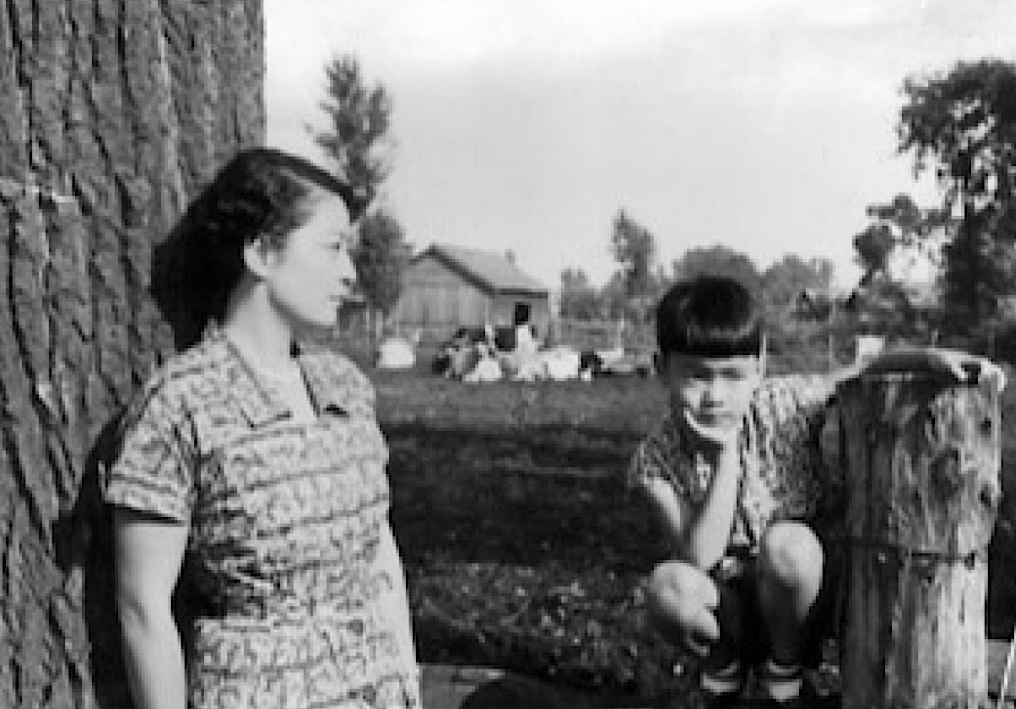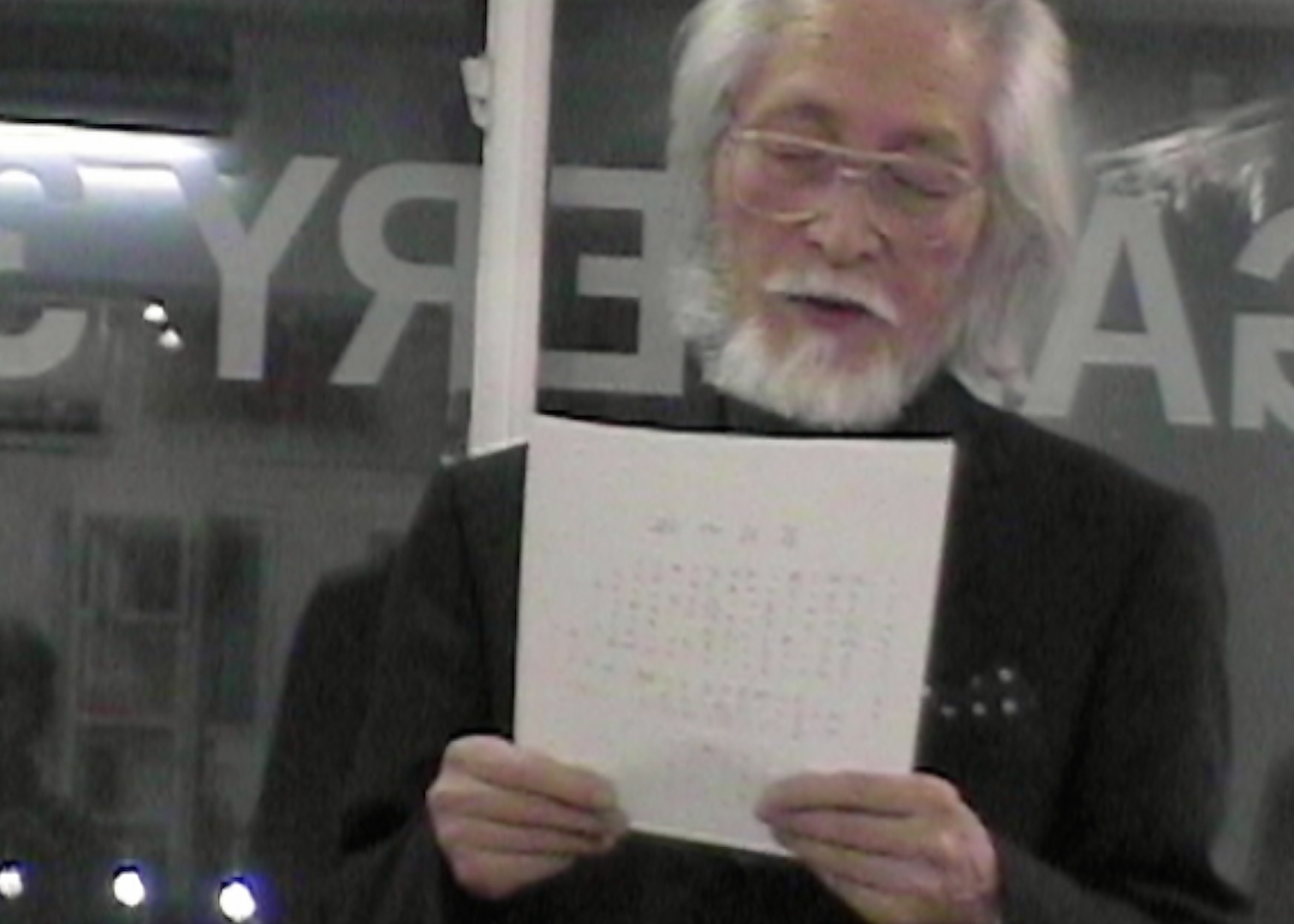Sunday, March 17, 2PM
MELTDOWN
SERIES OF EXPERIMENTAL JAPANESE FILMS
in conjunction with exhibition if the wind blows
Correspondence 10 (2005/16mm/36min.) Nobuhiro Kawanaka, Sakumi Hagiwara
Lately, I cannot help thinking; “What if the gods created life and death by mistake?” I find it odd that as I age, my body withers. If, as I slip into old age, my heart becomes young, then it would be appropriate if my body could follow suit. Wouldn’t it be nice if humans were born elderly, and in reverse, died of old age in an infant’s body? However, in such a world, children would have to assist their infantile parents without precisely knowing how to help them. At the end of last year, I suddenly came into a situation, wherein I had to live with my elderly mother. I had never even dreamed I would be taking care of my parents; so I found this situation very difficult to accept. And my mother couldn’t accept growing old and enfeebled herself. So there, towards the both of us, not accepting the state of things - I turned my camera to. I wonder how Kawanaka Nobuhiro will respond, looking towards his own body, and seeing the state of my mother’s body? I am looking forward to this investigation not based on any pre-established harmony. (Hagiwara Sakumi)
Nobuhiro KAWANAKA Born in Tokyo in 1941. Has been making experimental films since the 1960s. Founded Image Forum in the 1970s. While working as an organizer, he has single-handedly promoted experimental films throughout Japan and overseas. He has educated his successors at various institutions, including Tokyo Zokei University, Tama Art University, and Image Forum Institute of the Moving Image. He has made more than 100 short and feature-length films. His major works include Play Back (1973), Switch Back (1976), Correspondence Series (1979~), 5 Years Since (2018).
Sakumi HAGIWARA Born in Tokyo in 1946. Moving image maker, stage director, essayist. Participated as an actor in the formation of “Tenjosajiki: A Laboratory of a Theatre Play”, a theater group organized by Terayama Shuji. Has been engaged in activities of expression that transcend the boundaries of fields like experimental film, video art, woodblock printing, and photography since the 1970s. Director of Maebashi Bungakukan, Professor Emeritus, Tama University. Works include; Time (1971), Kiri (1972), Feb. 20 (1988), The Seas of Yamazaki Hiroshi (2018), and Correspondence 1 – 11 (a collaboration project with Kawanaka Nobuhiro, 1979 – 2010).
Five Colors of Man’yo (2014/8mm/3min.) Satoshi Yajimachi
Although Japan is an only atomic bombed country in the world, it spends a huge amount of money for nuclear power plants, resulting in an irretrievable accident called meltdown. I felt so hopeless that I could not choose theme of my work other than nuclear power issue. This work was created from such feeling. Using an 8 mm film discolored red by being exposed to X-rays, I arranged five poems expressing "impermanence" from "Man’yo-shu" Japanese classic anthology of poetry. 8 mm film itself, which is the original format of this work, is also a fading, beautiful and transient medium.
Satoshi YAJIMACHI Born in 1958 and living in Tokyo. A filmmaker and a dentist. After graduated from a dental university, she started working at the Tokyo Metropolitan Hospital for surgery, dentistry for the disabled, and orthodontic dentistry. Now she is a dentist in private practice. She has been involved in clinical dentistry for 32 years. She was familiar with art, music, especially movies since she was a young child. Since 2002 she studied video production at Image Forum Institute of Image Studies, and she started to produce film images beside dental practice. Recently she has been organizing performances using images and events collaborating with arts and traditional Japanese folk entertainments.
Ultimate Disposal Place (2018/Digifile/10:45min) Takashi Kunimoto, Wasabi Chili Films
What is it like to live at a ultimate disposal place for nuclear waste? A town in Germany where nuclear waste is already buried underground and a place in Japan where it is planned to build a disposal for part of the huge amount of nuclear waste produced by the Fukushima nuclear accident. Short documentary focusing on the voices of people actually living close to nuclear disposal sites. Would you like to live above a nuclear disposal?
Takashi KUNIMOTO Grew up in Tokyo, Japan. While studying at university, participated in a project interviewing survivors of the Nagasaki atomic bomb. After some short films, first feature length documentary „Traveling with Hibakusha: Across Generations“ (2010) about a voyage around the world to spread the story of witnessing the atomic bomb. In Kobe, work at civil media empowering youths using radio and documentaries. Following the accident at Fukushima Daiichi Nuclear Plant, decision to move to German in 2012. „Ultimate disposal place“ (2014) about nuclear waste. "Home away from home“ (2016) about immigrants living in Braunschweig. Film screenings in various regions in Germany and Japan. Currently attending HBK Braunschweig Art School. Film Projects in Japan and Germany. Father of three children.
Ψ Psy (2019/digital/41 min) Tenko Kuroda
Ψ is a Greek letter, now having several meanings including "Spirit" in psychiatry and "wave function" in quantum mechanics. It is also an alternative name for the artist Yutaka Matsuzawa. On March 11th, 2011 when the Fukushima nuclear power plant melted down and exploded after the Great East Japan Earthquake, I recalled a book by Yutaka Matsuzawa, "Quantum Art Manifesto.” Matsuzawa established his art using language, and tried to realize radical changes in consciousness using his art.
Tenko KURODA While studying law at Women's College, Meiji University in Japan, Tenko Kuroda was a member of a film study group and also performed in a film directed by Masao Adachi of Wakamatsu Productions. She studied under Genpei Akasegawa and Yutaka Matsuzawa in the class "The Final Art Thoughts" at Bigakko, an art school in Tokyo. Later, she traveled several times to India spending a total of two years in that country with her photographer husband. After the director Masao Adachi returned to Japan from Lebanon after spending twenty five years in the Middle East, she was inspired to start production of her first film, 21th Century Avant-garde (2011). She produced and directed "Ψ Psy" (2014).


